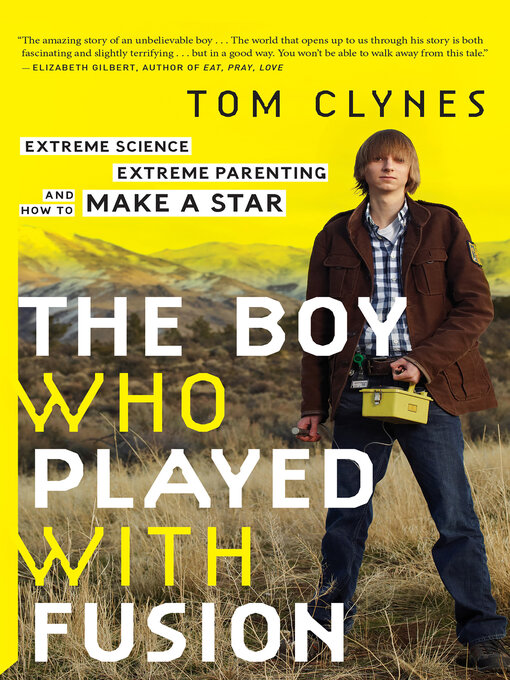The Boy Who Played with Fusion
Extreme Science, Extreme Parenting, and How to Make a Star
A PEN/E. O. Wilson Literary Science Writing Award Finalist
Like many young children, Taylor Wilson dreamed of becoming an astronaut. Only Wilson mastered the science of rocket propulsion by the age of nine. When he was eleven, he tried to cure his grandmother’s cancer—and discovered new ways to produce medical isotopes. Then, at fourteen, Wilson became the youngest person in history to achieve nuclear fusion, building a 500-million-degree reactor—in his parents’ garage.
In The Boy Who Played with Fusion, science journalist Tom Clynes narrates Wilson’s extraordinary story. Born in Texarkana, Arkansas, Wilson quickly displayed an advanced intellect. Recognizing their son’s abilities and the limitations of their local schools, his parents took a bold leap and moved the family to Reno, Nevada. There, Wilson could attend a unique public high school created specifically for academic superstars. Wilson is now designing devices to prevent terrorists from shipping radioactive material and inspiring a new generation to take on the challenges of science.
If you’re wondering how someone so young can achieve so much, The Boy Who Played with Fusion has the answer. Along the way, Clynes’ narrative teaches parents, teachers, and society how and why we urgently need to support high-achieving kids.
“An essential contribution to our understanding of the most important underlying questions about the development of giftedness, talent, creativity, and intelligence.” —Psychology Today
“A compelling study of the thrills—and burdens—of being born with an alpha intellect.” —Financial Times
-
Creators
-
Publisher
-
Release date
June 9, 2015 -
Formats
-
Kindle Book
-
OverDrive Read
- ISBN: 9780544084742
- File size: 15647 KB
-
EPUB ebook
- ISBN: 9780544084742
- File size: 15724 KB
-
-
Languages
- English
-
Reviews
-
Publisher's Weekly
September 14, 2015
In this insightful work, Popular Science editor Clynes goes beyond the fascinating story of fusion prodigy Taylor Wilson to offer cogent thoughts on our nation's education of gifted children, as well as sketching nuclear engineering's history and present status. In 2008 at age 14, Wilson became by far the youngest person in the world ever to achieve nuclear fusion. Clynes takes readers back to Taylor's early interest in rocketry and then all the way to his present as a young adult who wants "to grow a business that allows to create really useful things," like "a specialized particle accelerator that could revolutionize the production of diagnostic pharmaceuticals" or his "counterterrorism detection devices." Clynes helpfully matches passages on discoveries in chemistry, physics, and engineering to Taylor's own learning curve over the course of the book. He uses Taylor's story to illuminate examples of parenting and teaching of gifted children as well as to discuss more broadly the American education system's less-than-optimal treatment of the gifted. Amid this analytical content, the details of Taylor's life, achievements, and collaborators steal the show. -
Library Journal
May 1, 2015
When Taylor Wilson was 14 years old, he became the world's 32nd person to achieve nuclear fusion. He had shown creative genius early, constructing rockets in his backyard, much like Homer Hickam in Rocket Boys, before progressing to experiments with radioactive elements and particle acceleration. Today, after having produced innovations in medical isotopes and nuclear weapons detection, Wilson is regarded as an up-and-coming Steve Jobs or Bill Gates for the energy industry. In this book, Clynes (editor, Popular Science) asks how society can foster young talent such as Wilson's. Weaving the scientist's story with an examination of pedagogy in the United States, Clynes shows how parental encouragement, an individualized school curriculum, open access to information, and a culture of mentorship and hands-on experimentation all facilitate youthful prodigy. Ultimately Clynes concludes that society must do more to nurture young talent if we wish to address pressing problems such as climate change. Clynes makes a compelling case for pedagogical change but only scratches the surface in discussing the cost of individualized education, classist barriers to educational resources, the potentially stifling effect of academia, and the disruptive influence of childhood fame. VERDICT Recommended for educators and readers of biography and popular science.--Talea Anderson, College Place, WA
Copyright 2015 Library Journal, LLC Used with permission.
-
Formats
- Kindle Book
- OverDrive Read
- EPUB ebook
Languages
- English
Loading
Why is availability limited?
×Availability can change throughout the month based on the library's budget. You can still place a hold on the title, and your hold will be automatically filled as soon as the title is available again.
The Kindle Book format for this title is not supported on:
×Read-along ebook
×The OverDrive Read format of this ebook has professional narration that plays while you read in your browser. Learn more here.


